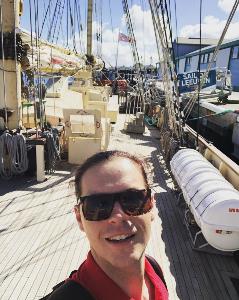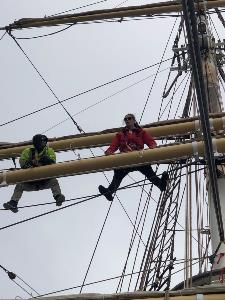When most people picture rural generalism, they probably don’t imagine torchlit suturing on a heaving ship in the middle of the ocean. But for Dr Thomas Drake-Brockman (they/them), an ACRRM Registrar and volunteer Ship’s Doctor with the Leeuwin Ocean Adventure Foundation —a Fremantle-based charity that runs youth voyages aboard Australia’s largest sail-training tall ship—it’s all part of the journey.
Drawn to the exceptional
Thomas has always gravitated toward the extraordinary - places, people, and medicine included.
“I've always been attracted to the exceptional, something different or off the beaten track. That sense of excitement and adventure led me to doing adventurous things well before I was a doctor, and that evolved into an interest in expedition medicine.”
Thomas’ medical elective with an air ambulance trust in the UK- treating patients on the scene of eight-lane highways - only cemented this passion for high-stakes care in extreme settings.
Rural medicine, meanwhile, was something of a “happy accident.” After missing out on a rural placement internship, Thomas accepted a metro hospital placement that included four months in Albany.
“What I discovered was that the smaller hospital and close-knit medical community delivered on far more than just better training. I've been hooked since.”
From student to Ship’s Doctor
Thomas’ journey with Leeuwin began in medical school, when they accompanied a young person with disability onboard as a career. The experience left a lasting impression.
“We had a challenging but hugely rewarding week that I don't think I'll ever forget. Needless to say, the power of the Leeuwin experience was impressed upon me.”
Since then, Thomas has progressed through the ranks as a volunteer crew member, taking on roles such as Watch Leader and Leading Hand. Their dual experience in healthcare and on deck made them a natural fit when Leeuwin needed a Ship’s Doctor.
“Leeuwin needs doctors who ‘get it’—who understand the demands of the program on the young people. I’ve been lucky to be mentored by the very lovely and generous Dr Jolmer Smit, a Rural Generalist based in Albany.”
Preparing for the unknown
Voyages require meticulous medical and logistical planning. Thomas is heavily involved in screening participants for health risks, preparing supplies, and advising on modifications to activities based on medical needs.
“Prevention is better than cure, especially when we're willingly going into a very resource-restricted situation. Once we leave our berth, we're at the mercy of the sea and the weather.”
There’s a careful balance between adventure and safety—ensuring no one is put in a position where they become the patient.
Life at sea: Ugg boots and all
Onboard, the most common issues are sea sickness, slips, and trips—but in the middle of the ocean, even routine problems become complex.
“Pulling over the car isn't an option. Once a sailor is unwell, it can take a fair bit of teamwork to get them feeling better—medication, hydration, and good cheer (perhaps a sea shanty?) are all part of the remedy.”
One unforgettable moment came when Thomas was woken in the night to stitch a facial laceration—using a dining table as an operating table, a head torch as surgical lighting, and ugg boots as impromptu footwear.
“I had been woken from sleep and slipped into the first shoes I found—ugg boots, which I can solidly confirm are terrible surgical attire. The patient was very brave and did well. We sailed for another five days and I took the sutures out before they disembarked.”
Maintaining calm in unpredictable environments is essential.
“There’s certainly an aspect of keeping a cool outward face, even if you’re a bit frantic inside. People look to healthcare professionals for reassurance.”
“I’ve volunteered with St John WA for over a decade. That’s a great lesson in resource-limited care—you learn to do what you can with what you’ve got and get people where they need to be.”
Rural training with a broader lens
Thomas credits their ACRRM training with enabling this unique path.
“As part of my training I spend a day a fortnight in the local hospital, managing inpatients and emergency presentations. That complements my primary care work and keeps my ward-based skills sharp.”
They’ve also been able to include a wide variety of experiences toward their Fellowship - from emergency medicine to obstetrics to their work with Leeuwin.
“There are a lot of situations now where I can comfortably say, ‘I've seen one of those before.’”
Advice for aspiring expedition doctors
For other registrars interested in remote or expedition medicine, Thomas offers this advice: “Hopefully you already have an adventurous hobby - aviation, kayaking, skiing. Nurture those interests in their own right and take the opportunities to mix work and play.”
“All the challenges are more fun when you view them as opportunities to learn and prevail, rather than barriers.”
Thomas is looking forward to a career filled with excitement and stories worth telling.
“I won’t share my list—but it certainly includes some far-flung places and adventurous modes of transport.”
Wherever they go next, it’s clear that Thomas will be ready—with a steady hand, a sea shanty, and perhaps even a pair of ugg boots.




